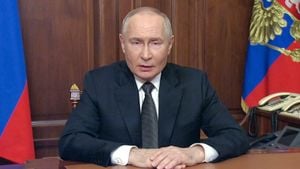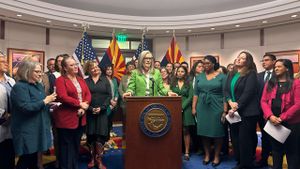On September 20, 2024, CERN, the European Organization for Nuclear Research, announced sweeping changes to its ties with Russian scientists, ending decades of collaboration stemming from the post-World War II era. This decision follows the turbulent backdrop of geopolitical tensions, particularly after Russia's invasion of Ukraine, which began in February 2022. The initiative aims to restrict Russian-affiliated researchers from participating in CERN's projects, effectively highlighting the divides within the scientific community influenced by national politics.
Established in 1954, CERN is primarily known for its Large Hadron Collider (LHC), the world’s largest and most powerful particle accelerator. Historically, it has served as a cornerstone for international scientific cooperation, involving over 24 member states and thousands of researchers from around the globe. With the impending changes, CERN plans to expel hundreds of scientists affiliated with Russian institutions by December 1, 2024. This decision marks the formal conclusion of its cooperation agreements with Russian entities, effective just before the end of the year.
The decision to sever ties with Russia was not impulsive; rather, it is the culmination of CERN's acknowledgment of the ethical and moral responsibilities toward the consequences of Russia's actions. According to the resolution passed by CERN's Council on December 15, 2023, the organization declared its intention to terminate the International Cooperation Agreement with the Russian Federation. This would also encompass all associated protocols allowing Russian participation.
While Russia has maintained observer status with CERN since 1991, the relationship shifted dramatically after the onset of the war in Ukraine. A spokesperson from CERN emphasized the commitment to peaceful scientific pursuits and indicated, “This decision reflects our position on the unlawful use of force and its ramifications.” Consequently, this move is seen as part of broader international scientific isolation efforts against Russia as Western governments continue to urge research institutions to distance themselves from Russian counterparts.
CERN’s expulsion is not universally supported. Some scientists believe this move could potentially stifle the exchange of knowledge and innovation. Hannes Jung, a particle physicist at the German Electron Synchrotron, posited, “It will leave a hole. I think it’s an illusion to believe one can cover [this gap] simply with other scientists.” His sentiments echo concerns among the scientific community, where collaboration across borders has long been hailed as the backbone of progress.
The termination of Russian affiliations also signifies dramatics distinctions within CERN itself. Although Russian scientists are losing direct access to CERN, CERN has decided to maintain existing collaborations with the Joint Institute for Nuclear Research (JINR) located near Moscow. This institute is significant as many foreign scientists, previously part of CERN projects, continue associational research at JINR.
Interestingly, reports indicate greater challenges arising not just from the lack of Russian participants, but from restrictions affecting all scientists cooperating with Russian institutions regardless of their nationality. This broader scope hints at additional complications for collective scientific pursuits as countries assess their affiliations with Russian-based researchers.
JINR’s situation is particularly noteworthy as it is seen as the last avenue for Russian scientists to participate actively and maintain connections with global collaborations. The expulsion will enable scientists already involved to continue studying but will explicitly bar new participants or those without historical links to CERN. “New faces are not allowed,” sources indicated, reflecting a tightening of cooperation pathways.
The historical significance of Russia's past contributions to CERN cannot be understated. Russian physicists played pivotal roles over the decades, influencing various groundbreaking experiments. Yet, as the institution grapples with maintaining scientific vigor, the geopolitical climate complicates the narrative. Some insiders fear this disconnection may embolden nationalist sentiments within Russia, bolstering the government’s portrayal of the West as primary adversaries.
CERN's leaders. maintained the adaptative and collaborative spirit. Meanwhile, some Russian scientists have expressed their dissent through anonymous channels, remarking how the growing divide is detrimental to the global scientific community’s objective of shared knowledge.
By the end of November, it will become apparent how these changes reverberate through the halls of CERN and beyond. The challenges posed by political engagement and scientific pursuits are set to evolve as the physical barriers between researchers widen, catalyzing new alliances and breaking down previous frameworks. The ultimate impact on physics research remains uncertain, yet significant, as individuals search for opportunities to create, innovate, and expand the horizons of human knowledge and inquiry.
Looking toward the future, the scientific community may need to adapt to these shifts, forging new partnerships based on shared values and objectives. The unique challenges and insights stemming from this episode will undoubtedly leave lasting impressions on the interconnected web of global scientific research.



